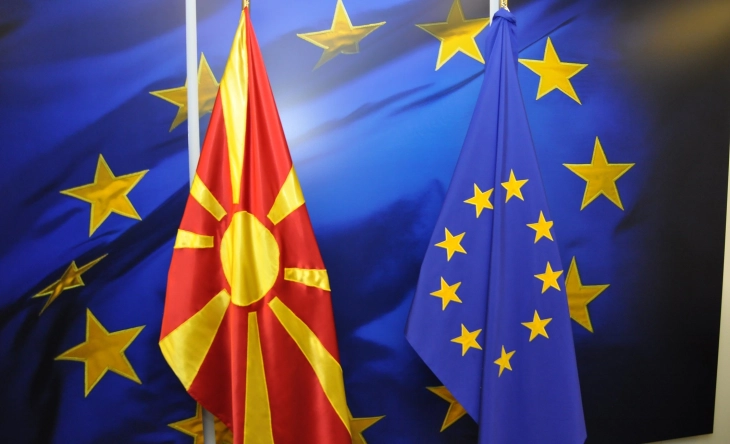Public Administration Reform Special Group between EU and North Macedonia holds 13th meeting
- The Public Administration Reform (PAR) Special Group between the EU and North Macedonia held its 13th meeting which was co-chaired by Sigrid Brettel, Head of Unit for Albania and North Macedonia at the Directorate General for Neighbourhood and Enlargement Negotiations of the European Commission, and by Goran Minchev, Minister of Public Administration, and Esma Adilovic, Head of Sector at the Ministry of Public Administration, said the Delegation of the European Union to North Macedonia in a press release Friday.

Skopje, 20 December 2024 (MIA) - The Public Administration Reform (PAR) Special Group between the EU and North Macedonia held its 13th meeting which was co-chaired by Sigrid Brettel, Head of Unit for Albania and North Macedonia at the Directorate General for Neighbourhood and Enlargement Negotiations of the European Commission, and by Goran Minchev, Minister of Public Administration, and Esma Adilovic, Head of Sector at the Ministry of Public Administration, said the Delegation of the European Union to North Macedonia in a press release Friday.
According to the Delegation, the Commission reiterated the importance of the PAR Roadmap, encouraging its swift finalisation and adoption, as well as its alignment with key reports and strategies.
“This remains an opening benchmark for Cluster 1 on the “Fundamentals”. It further stressed the need to establish robust monitoring and reporting mechanisms. The Commission welcomed the latest implementation reporting on the Public Administration Reform Strategy, underscored the importance of addressing delayed action items, and called for timely completion of such reports. It also emphasised the need for stronger political leadership to ensure coordinated implementation,” said the press release.
Regarding Public Finance Management, the Commission took note of the recent adoption of the Public Internal Financial Control Law and the adoption of by-laws to implement the Organic Budget Law, both of which are milestones under the Reform Agenda for December 2024. The Government also provided an update on the implementation of the Integrated Financial Management System, with the Commission emphasising the implications of this project for the conditionality related to future disbursements linked to the Reform Agenda.
On Policy Development and Coordination, the Commission encouraged the establishment of a functional strategic planning and monitoring system. It stressed the importance of regulatory impact assessments, public consultations, and strengthened quality control to improve policy coherence and effectiveness. The need for regular reporting on the National Programme for the Adoption of the Acquis was also underlined.
In the area of Public Service and Human Resources Management, the Commission reiterated the importance of merit-based, transparent recruitment and dismissals, swift adoption of revised civil service laws, clear rules for recruitment, assessment and dismissals of managerial staff, improved staff retention, reduction of number of acting senior managers, and better data collection on dismissals, appeals against dismissals and use of temporary and service contracts in the administration. It encouraged finalising salary system reforms and ensuring that remuneration reflects responsibilities and expertise.
Concerning Accountability, the Commission underscored the need for institutional and managerial accountability and welcomed ongoing reorganisation measures. Parties discussed the adoption of a new Law on the Organisation of the State Administration, the improvement of responses to public information requests, and the need to address the recommendations from the State Commission for the Prevention of Corruption of North Macedonia on nepotism and corruption risks. The Commission encouraged closer cooperation between the authorities and the State Commission for the Prevention of Corruption to effectively tackle these challenges.
On Service Delivery, the Commission urged the timely adoption of revisions to the Law on General Administrative Procedures and emphasised improving e-services for citizens and businesses. It encouraged the authorities to increase usage of the national e-portal and to streamline processes for enhanced user appeal. Finally, the parties discussed e-government and the alignment of the interoperability framework of North Macedonia with the European Interoperability Framework (EIF).
On Territorial Cooperation and Regional Development, the Commission encouraged stronger institutional capacities, stable staffing, and rigorous staff retention to ensure effective management and control of EU funds. The Commission underlined the importance of strengthening coordination across all government levels and preparing adequately for potential participation in future cohesion policy.
Photo: MIA Archive







